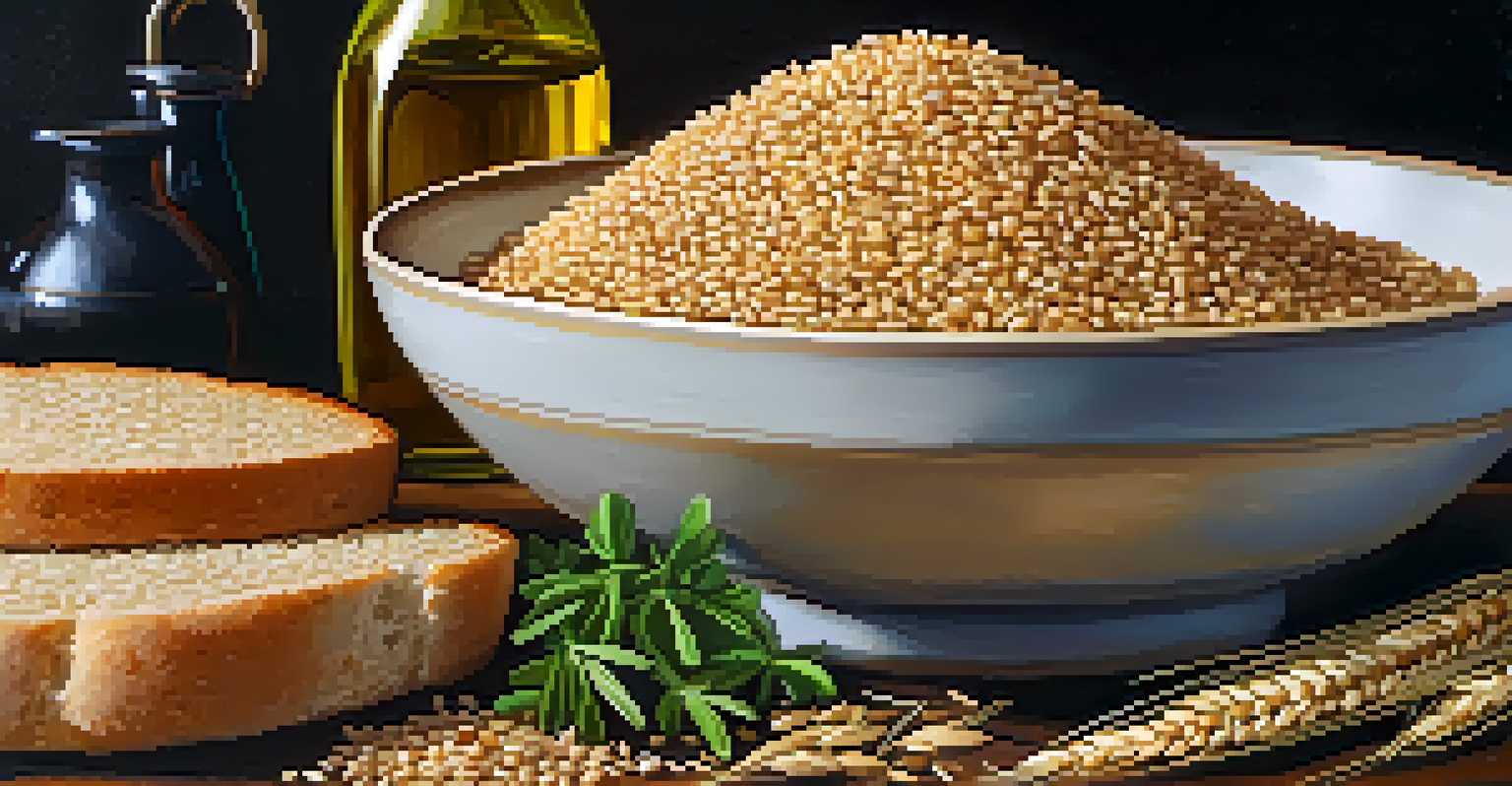Creating a Balanced Diet: Essential Nutrients You Need

What is a Balanced Diet and Why is It Important?
A balanced diet is one that provides all the essential nutrients your body needs to function optimally. It includes a variety of foods from all food groups, which helps ensure you get a wide range of vitamins and minerals. The importance of a balanced diet cannot be overstated, as it supports overall health and can prevent chronic diseases.
Let food be thy medicine and medicine be thy food.
Think of your body as a car; just as a car needs the right fuel to run smoothly, your body requires the right nutrients. Without a balanced intake, you might experience fatigue, weakened immunity, or even mood swings. By fueling your body correctly, you're not just maintaining your physical health but also enhancing your mental well-being.
Incorporating a balanced diet into your life doesn’t have to be complicated. Start by including fruits, vegetables, whole grains, proteins, and healthy fats in your meals. This way, you’ll be on your path to a healthier lifestyle.
Understanding Macronutrients: Carbs, Proteins, and Fats
Macronutrients are the three major nutrients that provide energy: carbohydrates, proteins, and fats. Each plays a unique role in your body; for instance, carbohydrates are your body’s primary fuel source, while proteins are essential for muscle repair and growth. Fats, on the other hand, provide long-lasting energy and help absorb fat-soluble vitamins.

Imagine macronutrients as the building blocks of your diet; without them, your body wouldn't function properly. Carbohydrates are like the quick energy snacks you need for a burst of activity, while proteins are your steady fuel for sustained energy. Fats might seem like the villain, but they’re crucial for overall health when consumed in moderation.
Balanced Diet for Optimal Health
A balanced diet includes essential nutrients from various food groups, supporting overall health and preventing chronic diseases.
To create a well-rounded diet, try to include a balance of all three macronutrients in each meal. Incorporate whole grains, lean meats, and healthy oils to ensure you’re getting the best of what each has to offer.
The Role of Micronutrients: Vitamins and Minerals
While macronutrients provide energy, micronutrients—vitamins and minerals—are essential for various bodily functions. These nutrients are critical for processes like metabolism, immune function, and bone health. Although they are needed in smaller amounts, their impact on your health is profound.
You are what you eat, so don't be fast, cheap, easy, or fake.
Think of micronutrients as the tiny but mighty superheroes of your diet. For example, Vitamin C is known for boosting your immune system, while calcium is vital for strong bones. A deficiency in any of these essential vitamins or minerals can lead to health issues over time.
To ensure you’re getting enough micronutrients, aim to eat a colorful variety of fruits and vegetables, whole grains, and lean proteins. This diversity not only enhances your meals but also helps you meet your nutritional needs.
Incorporating Fruits and Vegetables into Your Diet
Fruits and vegetables are powerhouses of vitamins, minerals, and fiber, making them essential components of a balanced diet. They not only help in maintaining a healthy weight but also reduce the risk of chronic diseases. Aiming for a mix of different colors can maximize the range of nutrients you consume.
Consider fruits and vegetables as nature's candy; they are sweet, satisfying, and much healthier than processed snacks. Try adding a serving of fruit to your breakfast, or keep cut veggies handy for a quick snack. The more variety you include, the more nutrients you’ll get.
Macronutrients Fuel Your Body
Carbohydrates, proteins, and fats are essential macronutrients that provide energy and play unique roles in bodily functions.
To make it easier, challenge yourself to try a new fruit or vegetable each week. This not only keeps your meals exciting but also helps you discover new flavors and textures.
The Importance of Whole Grains in Your Diet
Whole grains are an important source of complex carbohydrates, fiber, and essential nutrients. Unlike refined grains, whole grains retain their nutrient-rich bran and germ, providing more health benefits. They play a significant role in digestive health and can even help with weight management.
Think of whole grains as the sturdy foundation of your meal; they provide the energy needed for daily activities while keeping you feeling full longer. Foods like brown rice, quinoa, and whole wheat bread are excellent choices that can easily be incorporated into your diet.
To boost your intake of whole grains, aim to replace refined grains with whole alternatives. Simple swaps, like choosing brown rice over white rice or whole grain pasta instead of regular pasta, can make a big difference.
Healthy Fats: The Good, The Bad, and The Ugly
Fats are often misunderstood, but they are essential for hormone production, nutrient absorption, and overall health. There are different types of fats: unsaturated fats (the good ones), saturated fats (the bad ones), and trans fats (the ugly ones). Focus on incorporating more unsaturated fats, like those found in avocados and nuts, into your diet.
Imagine healthy fats as the smooth operator in your diet; they enhance flavors and help your body absorb nutrients. On the flip side, consuming excessive saturated and trans fats can lead to health problems, so it's crucial to choose your fats wisely.
Hydration is Crucial for Wellness
Staying hydrated is vital for digestion, nutrient absorption, and overall well-being, making it an essential part of a balanced diet.
To enjoy the benefits of healthy fats, sprinkle some nuts on your salad or drizzle olive oil on your vegetables. These small tweaks can significantly improve your overall health.
Hydration: The Unsung Hero of a Balanced Diet
When we think of a balanced diet, we often focus on solid foods, but hydration is just as important. Water plays a key role in digestion, nutrient absorption, and even temperature regulation. Staying properly hydrated can also help improve your energy levels and concentration.
Consider water as the silent partner in your dietary journey; it’s essential for everything from flushing out toxins to maintaining healthy skin. While it's easy to overlook, drinking enough water throughout the day can have a significant impact on your overall well-being.

To ensure you're getting enough hydration, aim to drink water regularly and include water-rich foods like fruits and vegetables in your meals. Setting reminders or carrying a water bottle can help you stay on track.